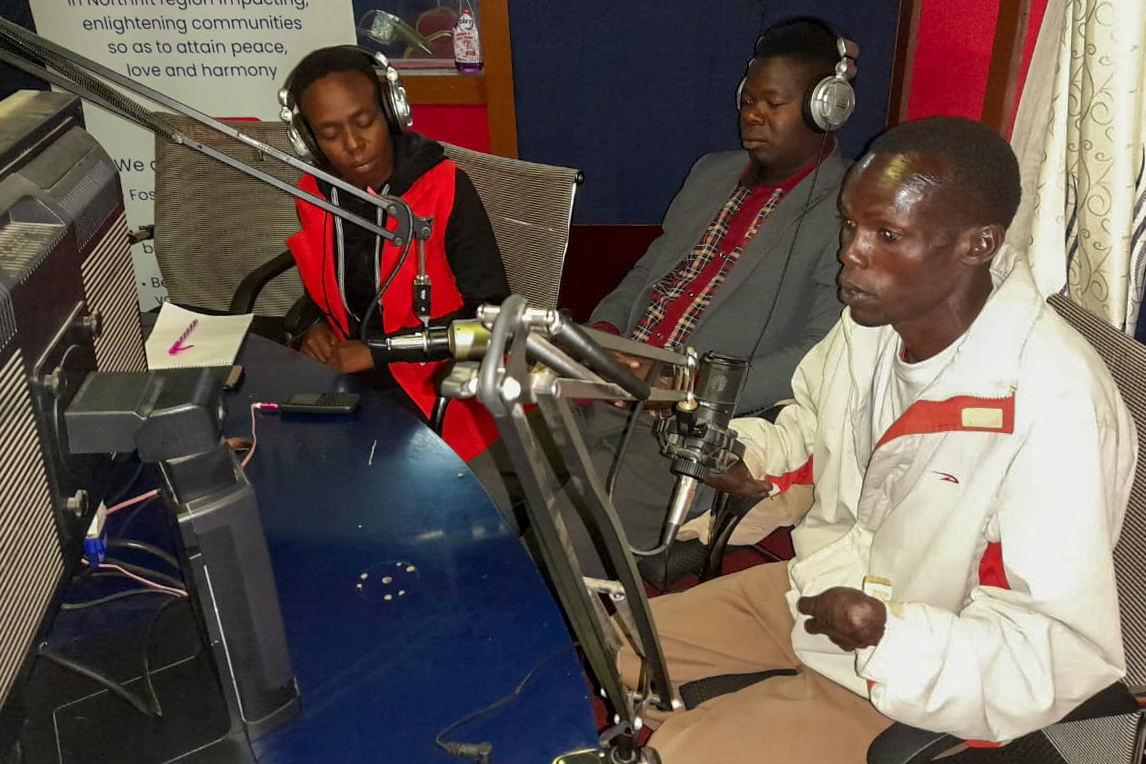Julius Keke (right), a 1992 post-election violence survivor, has turned into a peace envoy. Photo: West Pokot Youth Bunges Association.
With every general election since 2007, Felix Ochieng teetered to the brink.
The 2007 polls disgorged him into the familiar territory of unrest, destruction of properties and deaths.
Ochieng lives in Mathare, an informal settlement in Kenya’s capital, Nairobi. His brother, Moses Egesa, is a survivor of the 2007 post-election violence. Then, the country descended into chaos and was ripped apart along ethnic lines. Mathare was no different. Egesa’s neighbours turned against him, putting his house in flames and reducing it to ashes. He lost everything. A feisty crowd assaulted him.
At the time, Ochieng was in the Western part of Kenya and could not do much to save his brother.
“I was not at peace. Egesa almost lost his life,” Ochieng said during a training on conflict early warning and early response in Mathare. The training was by Pamoja for Transformation (PFT), a national peace and development organization. It equipped Ochieng with skills to detect triggers of electoral violence and act on them—and identify potential hotspots. PFT’s training is part of the USAID Kenya Electoral Conflicts Mitigation and Civic Education Support (ECCES) program.
Game-changer
Election time in Kenya is a period when desperate youth trade with the politicians. In a country where elections are highly monetised, what the youth, often organised in gangs, give to the politicians in return for the cash involves violence.

Veronica Ogada, Felix Ochieng and Stephen Otieno on July 10, 2022, at Huruma, Mathare in Nairobi. Ochieng led discussions conflict early warning and early response mechanisms with PCEA church congregants. Photo: PFT.
However, Ochieng, a youth aged 26, is not auctioning himself to the highest bidder. Instead, the training has earned him a moniker—peace ambassador. Ochieng traverses Mathare spreading anti-violence messages, which are slowly finding their mark.
“It was a process,” Mathare Sub-County Assistant County Commissioner (ACC) Benard Okwiri said of Ochieng’s mission.
And that process may be bearing fruit about two months after Ochieng started it in May 2022. One of ECCES’ objectives is to strengthen election violence and mitigation response and Ochieng’s actions contribute to it.
For instance, Ochieng visits youth zones and calls for peace—and peace holds. Recently, when one gubernatorial candidate in Nairobi incited violence in Mathare, Ochieng said he prevailed upon his peers and kept their cool.
“Mathare is a strategic area for PFT,” Sharon Makena, a program assistant at the organization, said.
The neighbourhood has a population of 206,504, according to the National Housing and Population Census (2019). It witnessed heavy police deployment in the past elections and fatal confrontations when locals protested. At least nine residents, including a 10-year-old girl, died in the last poll after police cracked down on protesters. The girl was not protesting.
“For him to go out of his way and start engaging other youth, and even convince them to drop violence, is a big deal.”
Ochieng said he has since trained six youth groups—including social justice centres—and dozens working in car-washes on conflict mitigation.
His constant dialogue is a game-changer.
ACC Okwiri said only through co-engagement with youth like Ochieng that results are achieved.
“You cannot assume people are together. When you engage them, you know and resolve issues you ignored. You cannot assume that we have peace without engaging,” Okwiri said.
Credible ballot
Ochieng estimates that he has reached over 500 youth through his in-person gatherings.
However, it’s not just about data but the impact, as Makena explained. “For him to go out of his way and start engaging other youth, and even convince them to drop violence, is a big deal. We attribute his courage to the ECCES training he attended,” she said.
“We should not bring back the 1992 and 2007 election wars…We must preach peace because there is life after election.”
Ochieng is among the thousands of locals who benefited from the ECCES program to initiate and expand peace. In Trans Nzoia county, Julius Keke, a 1992 post-election violence survivor, has turned into a peace envoy, attending radio talk shows and holding community meetings to urge a peaceful vote. He was permanently disabled during the 1992 election conflict.
“We should not bring back the 1992 and 2007 election wars. In 1992, houses in West Pokot and Trans Nzoia got razed down. In 2007, it was even worse. We must preach peace because there is life after election,” Keke said in one of the talk shows organized by the West Pokot Youth Bunges Association.
Keke also advised high voter turnout: “We get meaningful change through a credible ballot.” Civic education feeds into the ECCES objectives.
Hotspot counties reduce
Act! and its partners implement ECCES in 19 counties. In February 2022, the National Cohesion and Integration Commission (NCIC) flagged 23 devolved units likely to experience poll violence. ECCES is implemented in 13 of them.
The program’s activities took off in April following co-planning with national government structures at the county level. In June, NCIC reduced the hotspot counties to six. Eight ECCES counties dropped off the volatile list and were considered safe. They include Migori, Isiolo, Lamu and Bungoma. Others are Trans Nzoia, Kiambu, Nandi, Garissa and Nairobi.























